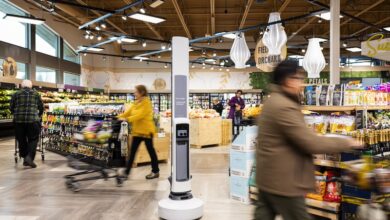How AI Chatbots Have Transformed the Travel Industry – Robotics & Automation News

The travel industry is witnessing a remarkable transformation driven by artificial intelligence (AI).
AI chatbots are rapidly becoming the go-to solution for businesses, offering a range of benefits for both travelers and service providers.
Let’s delve into the specific ways conversational AI is revolutionizing this dynamic sector.
3 ways chatbots elevate travel services
Gone are the days of scouring endless websites and navigating complex booking systems. Today, AI chatbots are revolutionizing the travel experience, acting as your personal travel concierge, available 24/7 to guide you from planning to post-trip support. Here’s how these intelligent virtual assistants support the travel industry.
Personalized travel planning and Boboking
Imagine having a 24/7 travel concierge in your pocket. AI chatbots can act as virtual travel assistants, understanding user preferences and travel styles.
Here’s what they have to offer:
- > Tailored recommendations: Based on user input and past travel behavior, chatbots can recommend destinations, flights, hotels, and activities that align with individual interests.
- > Itinerary creation and management: Chatbots can assist in creating personalized itineraries, suggesting must-see attractions, booking tours, and even making restaurant reservations.
- > Dynamic travel arrangements: Flight delays or cancellations? No problem. Chatbots can help users rebook flights, reschedule activities, and find alternative accommodations.
This level of personalization streamlines the travel planning process, saving users time and ensuring a more enjoyable travel experience.
24/7 Customer Support
Gone are the days of waiting on hold for customer service. Chatbots provide instant support throughout the travel journey with:
- > Pre-trip inquiries: Whether it’s visa information, baggage allowance, or local transportation options, chatbots can answer a wide range of questions around the clock.
- > In-trip assistance: Need help finding a restaurant or booking a last-minute tour? Chatbots can provide real-time assistance during the trip itself.
- > Post-trip support: Chatbots can facilitate feedback submission and handle post-trip inquiries, ensuring a seamless end-to-end experience.
This 24/7 availability enhances customer satisfaction and allows staff to focus on more complex tasks.
Streamlined operations
Conversational AI can significantly benefit the internal workings of travel businesses through:
- > Automated tasks: Chatbots can handle routine tasks like collecting guest information, responding to basic inquiries, and processing simple requests. This frees up human staff to focus on higher-value tasks like guest relations and problem-solving.
- > Reduced operational costs: Chatbot implementation can lead to cost savings by reducing the need for additional customer service staff. A recent study by Juniper Research estimates that AI chatbots will save the travel and tourism industry $8 billion by 2023 through reduced operational costs.
- > Data collection and analysis: Chatbots can gather valuable customer data during interactions. This data can be used to personalize future experiences, develop targeted marketing campaigns, and make data-driven decisions.
By streamlining operations and improving efficiency, chatbots allow businesses to cater to a wider audience and increase profitability.
Examples of chatbot applications in travel
Several successful chatbot use cases showcase the potential of AI in this sector:
- Marriott International‘s Marriott Bonvoy Chatbot provides personalized recommendations and helps guests with various tasks throughout their stay.
- Hilton’s Hilton Honors AI Chatbot offers real-time support for booking, check-in, and loyalty program inquiries.
- Trip.com‘s TripGen AI Chatbot creates personalized travel itineraries based on user preferences.
These examples demonstrate how chatbots are transforming the way travelers interact with accommodation brands.
The future of AI chatbots in travel
The future of conversational AI in travel looks bright. Here are some exciting possibilities:
- > Multilingual support: Chatbots that can communicate in multiple languages will further enhance accessibility and cater to a global audience.
- > Integration with wearable technology: Imagine using a smartwatch to interact with a travel chatbot for real-time information and on-the-go assistance.
- > Advanced personalization: Chatbots leveraging AI will learn user behavior patterns and preferences over time, offering hyper-personalized recommendations and an even more seamless travel experience.
As AI technology continues to evolve, AI chatbots will play a pivotal role in shaping the future of travel. By providing personalized service, streamlining operations, and building stronger customer relationships,
AI chatbots are poised to revolutionize the way we travel and experience the world.



